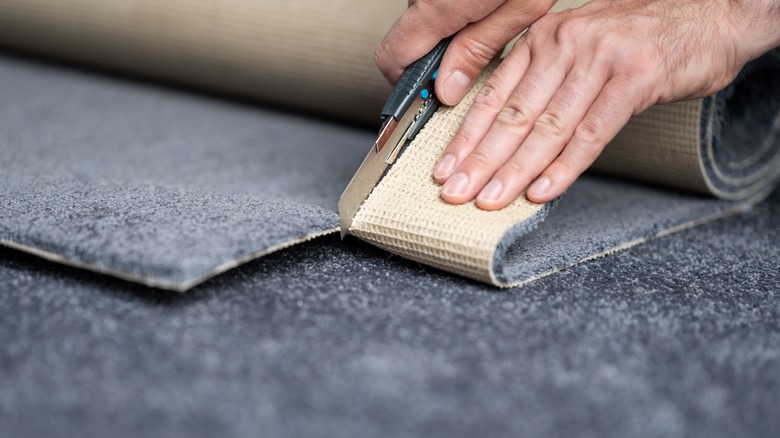The Best Type Of Carpet To Install In Your Basement
When choosing the ideal carpet for your basement, there are several fundamental qualities to keep in mind, including water resistance, pile height, and underpadding. If you notice persistent dampness in your basement, a water-resistant carpet is essential. Basements are below ground level, so they are prone to humidity and potential water damage. This moisture typically comes from a few key sources.
Particularly if your property is in a low-lying area or the basement isn't effectively waterproofed, groundwater may seep from the nearby soil. Leaky appliances or pipes above can also be blamed for the slow dripping of water into your basement. Even everyday activities like cooking, taking a shower, or doing the laundry can increase indoor humidity, which leads to moisture buildup in the basement. Last but not least, rain or melting snow may get into your basement if your drainage system is inefficient during rainy seasons.
By taking action and being aware of these factors, you can reduce dampness in your basement. A carpet that is stain- and spill-resistant should be used if your basement will see a lot of foot traffic or is likely to see spills.
Factors to consider when buying a basement carpet
As mentioned, it's important to choose water and stain-resistant carpets. Synthetic fibers like nylon shine here thanks to their inherent ability to resist water absorption. These materials discourage mold and mildew growth and maintain their structure and appearance even in damp conditions.
The pile height, or the length of the carpet fibers, is another aspect you need to consider. A low-pile carpet is optimal for basements, balancing comfort and practicality. Low-pile carpets are easier to clean and are less likely to harbor allergens. They are also more water-resistant than high-pile alternatives and offer more resistance to mildew.
Carpet squares, also known as carpet tiles, are also an excellent choice for basement flooring. Because basements are often prone to moisture, using carpet squares offers the advantage of easy replacement. Instead of replacing the entire carpet, you can replace the affected tile if a certain carpet area becomes discolored, wet, or damaged. In the long term, this can save you a lot of time and money.
Consider the carpet's resilience as well. Selecting a permeable carpet may effectively lower the chance of mold and mildew formation because it is less prone to collecting moisture. By choosing a permeable carpet, you can improve your home's indoor air quality and extend the life of your basement flooring. Lastly, don't underestimate the power of a good underpad. The underpad you choose must have a dual purpose: to insulate against the cold and protect against potential moisture.
Is it a good idea to add a carpet in your basement?
Adding a carpet to your basement can be a fantastic idea, providing practical benefits and aesthetic appeal. You are converting an often underutilized area into a functional, cozy extension of your home. Carpeting offers comfort underfoot that hard flooring cannot match. They come in especially handy if you're planning to transform your basement into a living area or game room — the added coziness of carpet can significantly enhance your comfort.
Carpets also act as a thermal barrier, retaining warmth during cold seasons and keeping your space comfortable. Additionally, carpet insulation effectively reduces noise transmission, especially if you opt for the acoustic type. This carpet type will come in handy if your basement is a hub of activity or if you're considering setting up a home theater or music room, as the carpet can help reduce noise transmission to the upper levels of your home. Lastly, should a significant water leak occur, it's possible to dry your carpet quickly enough to prevent mold or mildew growth.
Despite the benefits, it's essential to approach carpeting your basement cautiously, considering the unique challenges. As mentioned earlier, moisture is the primary concern since basements are often more humid and prone to water leaks or flooding. Some carpets trap dirt which can cause mildew buildup on the carpet if you don't maintain it. Therefore, choosing the right carpet material, pile height, and underpad can address these issues, making your carpet more durable and resistant to potential water damage. So yes, adding a carpet to your basement can be beneficial but only if you take the right precautions.


